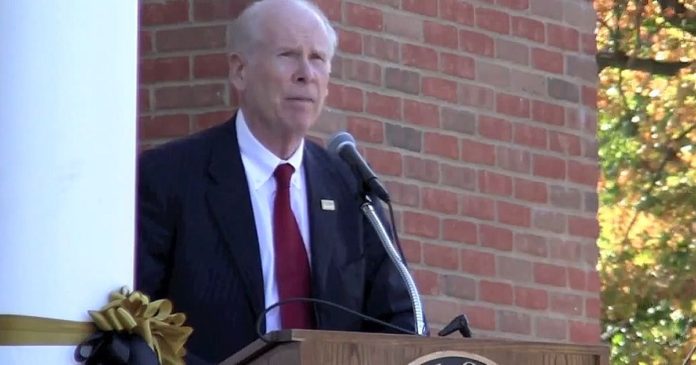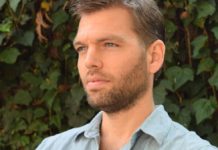“The government wasted time and resources indicting a man who had progressive dementia and was terminally ill,” Keneally said.
In his younger days, Brockman was known as an inexhaustible worker with a passion for physical fitness, fly fishing in Colorado and dove hunting in Argentina. Forbes estimated his net worth to be $4.7 billion.
A Florida native of modest origins, Brockman was selling computing services to auto dealers on behalf of International Business Machines Corp. when, in 1970, he founded a company that helped revolutionize how the industry operates in North America and Europe.
In addition to the dealer management software system, Brockman, a self-taught programmer, obtained more than a dozen patents, and grew Reynolds and Reynolds into a 5,000-person operation worth some $5 billion.
As Brockman built his company into an industry force, he also defended numerous lawsuits accusing him of bare-knuckled business practices. Salespeople accused his company of stiffing them on payments; auto dealers said he tricked them into expensive multiyear contracts. The Federal Trade Commission investigated whether he engaged in anti-competitive practices.
A former Marine reservist who surrounded himself with loyal lieutenants, Brockman had an intense desire for personal privacy that extended to his dealings with the Internal Revenue Service.
“Brockman had one rule: Don’t do business with the government,” said Robert Tyson, an entrepreneur who won a lawsuit against Brockman for unpaid compensation for services rendered. “He didn’t want the feds looking at anything.”
In October 2020, the US charged Brockman in the largest tax-evasion case ever against an individual, as well as on money-laundering charges.
Burner Phones
Brockman helped launch the private equity career of Robert F. Smith, America’s wealthiest Black citizen, by providing the initial investment in his firm, Vista Equity Partners. Prosecutors alleged Brockman used a web of offshore entities, code names and burner phones to hide $2 billion in income from the IRS, most of it earned through Vista investments.
Smith admitted committing tax crimes but avoided prosecution by cooperating with prosecutors against Brockman.
The case against Brockman hinged on whether billions of dollars in an offshore charitable trust were secretly controlled by him, as prosecutors alleged, or were independently managed, as he claimed. Prosecutors said he used untaxed proceeds from offshore entities to buy a Colorado fishing lodge, a private jet and a 200-foot yacht, which his lawyers denied.
“I have not seen this pattern of greed or concealment and cover-up in my 25-plus years as a special agent,” James Lee, an IRS official, said when the charges were filed.
Brockman pleaded not guilty, but his lawyers soon began arguing that dementia left him unable to assist in his defense.
Robert Theron Brockman was born in St. Petersburg, Florida, on May 28, 1941. His father, Alfred Eugene Brockman, owned a gas station. His mother, Pearl, was a physiotherapist. With the family struggling financially, Brockman “decided he didn’t love that and went out to make something of himself,” his younger brother, David, told the Wall Street Journal in 2021.
Seeding Vista
After graduating summa cum laude from the University of Florida in 1963, Brockman worked as a marketing trainee at Ford Motor Co. before moving to IBM, where he became a top salesman in Washington and Houston. In 1970, he set up his own firm, Universal Computer Systems, and began providing auto dealerships with weekly inventory reports.
As Brockman built his company, he met Smith, then a rising Goldman Sachs technology investment banker. Brockman later seeded Smith’s firm, Vista, with at least $1 billion in funds to buy out enterprise software firms.
The partners structured their arrangement to keep profits offshore, prosecutors say.
In 2006, Brockman brought his software and investing interests together to engineer the acquisition that thrust UCS into the big leagues. Brockman’s closely held firm bought Reynolds & Reynolds, a public company nearly twice its size. Part of the equity financing came from Vista’s original fund, in which Brockman was the sole outside investor.
The combined firm took the Reynolds & Reynolds name and was controlled by a Bermudian charitable trust set up in the name of Brockman’s father. As Brockman’s wealth grew, so did the trust’s offshore assets.
In addition to the $5 billion worth of software company holdings, they included $1.3 billion in investments made through an entity based in the British Virgin Islands and $1.4 billion in a Swiss bank, his wife, Dorothy, said in an affidavit filed in a Bermudian court.
Support for Opera
The Bermudian trust and the Brockmans also became active philanthropists. Their gifts included tens of millions of dollars to the Baylor College of Medicine, where Brockman was a trustee, and the Brockman Hall for Opera at Rice University in Houston. They also supported dozens of students with scholarships.
However, in 2018 US tax authorities raided Brockman’s attorneys in Houston and Bermuda. They uncovered a cache of encrypted documents and messages that prosecutors used in building their criminal case against Brockman.
In September 2021, the IRS assessed Brockman for $1.4 billion, related to taxes it said he owed from 2004 to 2018. The case is pending in US District Court and Tax Court, and the battle against his estate could last years.
“Whether Bob Brockman in fact owed more taxes, which we dispute, can await a decision by the Tax Court,” Keneally said.
He is survived by his brother David; his wife of 53 years, Dorothy; a son, Robert Brockman II; a daughter-in-law; a grandson; and a granddaughter.
Credit: Source link






























